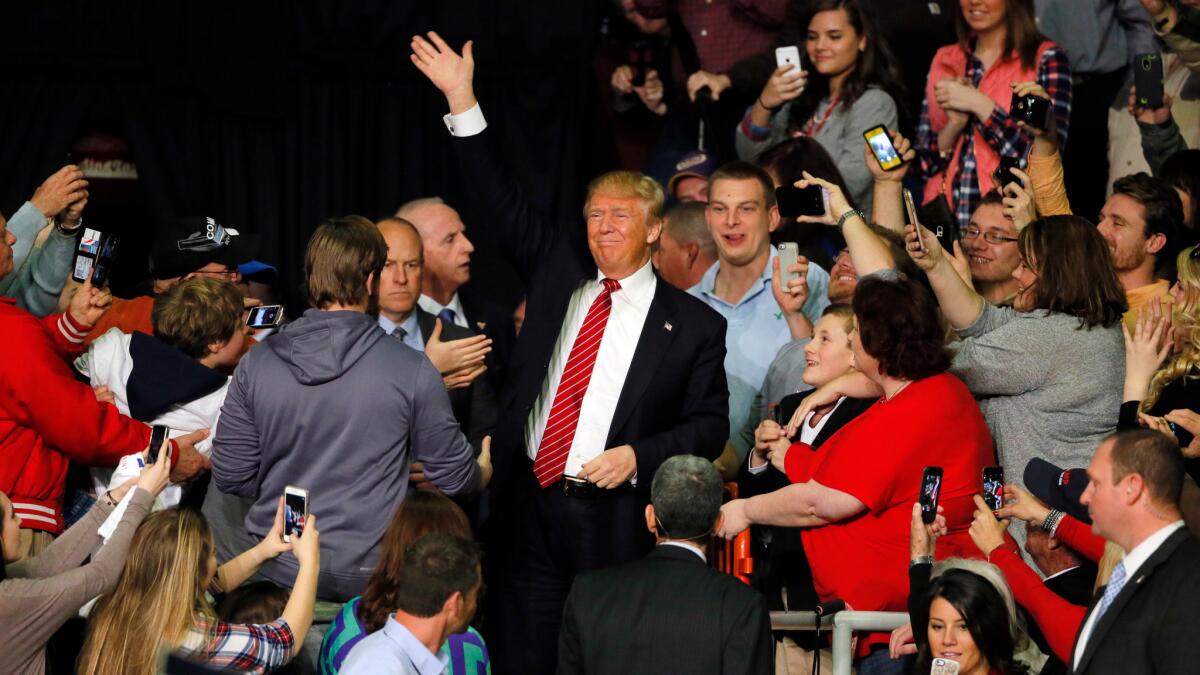Editorial: Vote for anyone but Trump in the California primary

Republican presidential candidate Donald Trump waves to supporters during a campaign stop in Little Rock, Ark. on Feb. 3.
California Republicans will find themselves in a familiar position when they cast their votes in the June 7 presidential primary. The party has already chosen its putative nominee — in this instance, real estate mogul Donald Trump — because contests earlier on the calendar have winnowed the field to one. Even more disturbing than the lack of choice, though, is the fact that this year that process has resulted in the survival not of the fittest candidate but of the least fit: a blowhard businessman with little knowledge about the way government works, a fondness for crackpot ideas (a wall on the Mexican border, a ban on Muslims entering the country), a penchant for petty feuds and a habit of demeaning women.
That’s a shame, not just for the parochial interests of Republicans in this state but also for the party nationally and for the country itself. Earlier this week, The Times endorsed Hillary Clinton in the California Democratic primary next month. But we obviously cannot endorse Trump in his primary; we can only urge California Republicans to cast a protest vote for some other candidate.
Explanations for Trump’s success abound, but the overarching reality is that Republicans better suited than he in both experience and temperament failed to gauge the mood of the electorate or to connect with voters as successfully as he did. Voters across the Republican landscape were so eager for dramatic change that they weren’t content just to reject mainstream candidates. They were ready for an entirely new message, and Trump was happy to oblige.
For years, political analysts have wondered why the conservative Republican agenda played so well with working-class white voters. After all, that agenda — tax cuts that mainly benefit the upper brackets, regulatory relief that helps big business, a trade policy that benefits multinational corporations and a foreign policy that sends many working-class people to die overseas — seems to offer few or no direct benefits for the average American.
So finally, this year, that message failed, along with its messengers. Instead, bearing a potent new pitch, came Trump, the brash, blunt, orange-haired billionaire who emerged from out of nowhere (though tens of millions of Americans had watched him on “The Apprentice”), to the amazement of the political establishment and media elite. Trump played on voters’ anger and anxiety by talking about sealing the borders, tearing up trade deals and pulling back from foreign entanglements — effectively repudiating policies championed by the GOP’s pro-business and neoconservative wings. Harping endlessly on his own wealth and personal success, he ran up the most unlikely string of victories in modern political memory, defeating one opponent after another — governors, senators, scions, favorites — in state after state after state. One doesn’t have to agree with Trump on any of his issues to realize that his success is a bracing wake-up call for the Republican Party. It now knows that the rank-and-file aren’t beholden to the agenda it has pressed, and will accept in its place vague statements, inconsistencies, shallow thinking, sloganeering and even bigotry from a candidate with an appealing personality and a tone that resonates.
Where Trump hews most closely to other contemporary Republicans is in his scathing denunciation of Washington, a Republican target even before Ronald Reagan declared that government was the problem, not the solution. What Trump adds is contempt not just for the institutions of government, but for the people in them. This is a poisonous extension of a damaging argument. It’s one thing to recognize that millions of Americans are turned off by Washington’s endless partisan battling, but it’s another to encourage voters to be even more cynical about their elected representatives.
It’s worth noting that Sen. Bernie Sanders has been making a related case about corrupt and unrepresentative government in his bid for the Democratic Party’s nomination. And his message, too, has caught on, albeit with a different demographic. So the frustration and distrust are clearly not confined to one side of the ideological spectrum. At some fundamental level, a broad swath of Americans believe that government has failed them.
Democrats are still choosing between two candidates with specific, policy-heavy pitches — Sanders and his promise of sweeping, even utopian change and Hillary Clinton with her more incremental agenda of building on President Obama’s legacy. Meanwhile, millions of Republicans have fallen under the spell of a snake-oil salesman. That’s an indictment of the Republican Party, but it also is a judgment on politics and political discourse more generally.
Follow the Opinion section on Twitter @latimesopinion and Facebook
More to Read
A cure for the common opinion
Get thought-provoking perspectives with our weekly newsletter.
You may occasionally receive promotional content from the Los Angeles Times.






